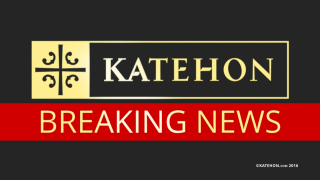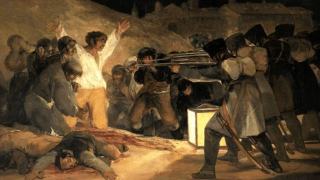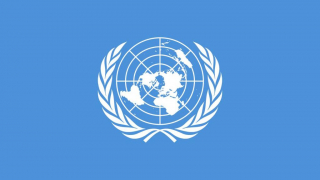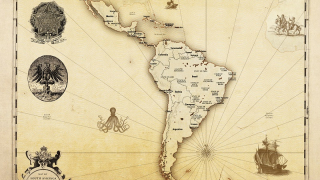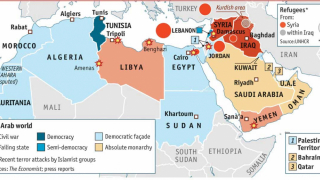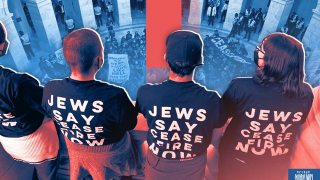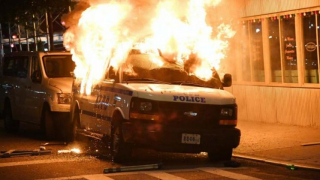From Bahrain: The Untold Story
17.12.2017
Demonstrations continue in Bahrain demanding justice and the release of prisoners of conscience, amid the deterioration of human rights situation and the continuous attacks by the riot police against peaceful protesters using excessive force.
Sheikh Ali Salman, the head of the largest opposition group in Bahrain, which advocates political reforms is one of the prominent prisoners of conscience. He was arrested on charges that are essentially fundamental rights, stipulated in the international covenants, particularly the Universal Declaration of Human Rights and the International Covenant on Civil and Political Rights.
Sheikh Salman is temporarily serving a four prison term with other Bahraini opposition figures who were arrested due to calling for democracy, in the aftermath of February 2011 unrest.
Bahrainis’ Spiritual Leader
Bahrain Public Prosecution stripped the spiritual leader of the Shiite majority Sheikh Isa Qassim of his citizenship, in June 2016. Further, it brought against him the charge of ‘money laundering’, which is related to his participation in the religious practice of khums. Since then, Sheikh Qassim has been rendered stateless, kept in house-arrest, isolated from his family and followers, and deprived from medical care.
In the Shiites community, Khums is an obligatory annual religious practice of donating funds, organized by specific and expert religious scholar. Khums is spent for charitable reasons to eliminate poverty, assist the most vulnerable classes and to maintain harmony within society.
Up to May 2017, a peaceful sit-in was held in front Shiekh Qassim’s residence, in the Bahraini Duraz village, west of Manama the capital city, in solidarity with this religious and national symbol. On 26 January 2017, masked and plainclothes officers raided the peaceful sit-in, fatally fired live ammunition in the head of 18-year-old youth Mustafa Hamdan.
In May 2017, and after assurances by Trump, the authority mounts another deadly raid, in which officers fired tear gas and shotguns at protesters, triggered clashes left at least five demonstrators dead, more than 100 injuries and 286 people arrested. The raid was launched by scores of security men and armored vehicles against the peaceful protesters.
Prosecuting Sheikh Qassim
According to many observers, the prosecution of Sheikh Qassim is a reprisal against his fundamental rights amid the governmental systematic campaign designed against the Bahraini Shiite community.
Sheikh Qassim is an indigenous Bahraini citizen, the most high-ranking Shiites scholar privileged by the religious title of Ayatollah. Qassim was one of 21 elected members of the Bahraini Constituent Assembly, which drafted Bahrain’s first constitution in 1972. In 1973, he was a member of the National Assembly, and following its dissolution in 1975, Qassim directed his energies to his duties as a religious scholar and preacher.
Sheikh Qassim believe that the best mean for enhancing security in Bahrain and meeting the aspirations of all Bahrains, regardless their background or belief is the approach of reform and national reconciliation. He is a moderate symbol who has been working hardly to prevent chaos in Bahrain, and drawing Bahrainis attention to wisely confront extremist policies and sectarian incitement. He calls for dialogue as a method to surpass political disputes based on his shrewdness and perspicacity.
Up to June 2016, he used to preach in Duraz village in Bahrain at Imam Sadiq mosque. His followers, media and the authority used to follow up his regular speech that precedes the Friday prayer, in which he dissects political issues. He recommends tolerance and national and Islamic unity. Qassim has the vantage in stabilizing security in Bahrain throughout critical periods. He has a great influence among Shiites in Bahrain, Gulf States, and the Muslim world.
Heinous Violations
The politically motivated trial of Sheikh Isa Qassim constitutes a heinous violation against 70% of Shiites majority of the Bahraini population. Rendering him stateless violates his right to nationality, and his trial in absentia constitutes a violation of his right to a fair trial. Further, his prosecution appears to threaten his right to practice religious rituals.
Temporarily, the village of Duraz is sieged, and the Friday prayer has been banned. Symbolically speaking, Duraz is the birth place and home town of Sheikh Qassim and other dissents, and it has long endured systematic persecution practiced by the government. It is worth noting that the revocation of citizenships is a political tool utilized by the authority, due to the political division based on political and sectarian lines.
Sectarian Terminology
The terminology of the government is a blatant assault upon a venerated religious scholar and leader, which is a reckless tool amid the spread of sectarianism in the country. Obviously, Bahrain plays the sectarian card as it backs ideologists who promote the culture of sectarian intolerance. Those Takferi ideologists publicly promote the systematic campaign and call for purifying Bahrain from Shiites, dubbing them as ‘Iranians, Infidels, Majoosis, Rafidas, Traitors, Safawis, Unpatriotic’, and many other degrading social frames.
Besides, Duraz village is still sieged for illegal reasons, and its residents are facing many violations including the infringement against their religious freedom, obstruction to freedom of movement, internet blackout, repression of protesters, and the excessive use of internationally prohibited weapons and tear-gas bombs.
The American Green Light
On 21 May 2017, the US President Donald Trump met the Bahraini king and said that the relations between the United States and Bahrain were set to improve. Additionally, the Prime Minister Prince Khalifa bin Salman Al Khalifa welcomed the ‘positive changes in the USA policies towards the region and its countries, and the understanding of the US Administration.’
President Donald Trump ignored the demands of the Bahraini people to reforms, and to protect their fundamental human rights, in bid to Sell Bahrain F-16 Jets. Paradoxically, the military deal was operated amid the critical political and economic crisis in the country.
Life of Sheikh Isa Qassim in Danger
Meanwhile, the life of Sheikh Isa Qassim has been particularly critical and intolerable. Qassim has been under de facto house arrest since May 2017, depriving him from receiving vital medical care. Qassim’s followers are ready to sacrifice themselves for his sake.
The prominent scholar Sheikh Isa Qassim is in his late 70s and needs urgent medical treatment. At this critical time, the ethical and international responsibility makes it imperative for every free people to move prior the disastrous consequences. In addition, the Bahraini authority must immediately halt Shiekh Qassim’s continuous house arrest and rescind the unlawful military siege.
Conclusion
The crisis in Bahrain is expected to escalate amid the lack of accountability, impunity, undermining the political activism, exerting pressure on human rights activism, and giving comprehensive powers to the security authorities to prosecute and torture citizens.
Undoubtedly, the efforts by the Bahraini government to refine its image will not succeed in concealing its repressive crackdown on all forms of peaceful opposition. Instead, it must tolerate the peaceful opposition, release all prisoners of conscience and take effective measures towards real reform through genuine dialogue. The government crackdown will neither subordinate Bahrainis nor make them retreat in terms of demanding their fundamental rights, whatsoever.
Certainly, the outstanding political and legal crisis in the country demands the international community to immediately exercise its active role through breaking the security siege on Shiekh Qassim. Moreover, to put an end to the violation against public freedoms, and the excessive use of force while dealing with peaceful demonstrators.


